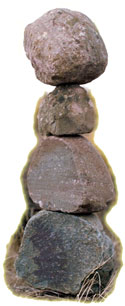![]()
The
Fourth Week of Lent:
Fidelity and Espousal

Monday
The desert has always been a place of testing. Anyone who reads the divine office is familiar with this idea in Psalm 95: "Harden not your hearts, as at Meriba, as on the day at Massah in the wilderness, when your fathers tested me, and put me to the proof, though they had seen my work. "
In the desert, Israel put Yahweh himself to the test, and this is peculiar to her tradition. Yahweh's love and fidelity were proven everlasting and unwavering. Essentially, however, the desert is God's testing ground for humanity. Israel survived her desert experience by outfighting and outwitting the elements and the emptiness, by abandoning herself to God who carried her in his arms as a father carries his child.
Tuesday
Elijah was the next great desert man in biblical history. Israel had regressed and taken on the baggage and bondage of the overcivilized Canaanite cities. So Elijah walked forty days and nights into the desert to find Yahweh where he had first revealed himself to Israel. There in eremitical solitude, Elijah became a God-intoxicated man and a prominent figure in the most pressing and dramatic issues of his day. He resolved the problems of the Jews with desert directness. Fearlessly facing the full assembly of his countrymen on Mount Carmel, he lashed out at their indecision with the stringent words: "How long, O Israel, will you limp between two sides? If the Lord be God, follow him! But if Baal, then follow him" (1 Kings 18:21). He then challenged the priests of Baal to a showdown of strength, a trial by fire.
Wednesday
Elijah was unyielding. He learned the desert lesson of reality and clung to it tenaciously. On this bedrock, steadfastly, he took his bold stand: "The Lord God of Israel lives, before whom I stand" (1 Kings 17:1). These words comprise the shortest and most effective autobiography ever written. Their effect was immediate and brought down from heaven a lightning bolt of flame upon the altar, giving Israel a sure sign of the right side to be on. These words have remained the charter of all contemplatives ever since, particularly Carmelites, who regard Elijah as their spiritual father.
Thursday
Elijah not only settled political, social, and moral crises, but even a weather crisis of three years' drought. The narrative in 1 Kings indicates that he was a man on the move, propelled here and there by the Spirit's "Get you hence!" He did not escape into the desert; he refueled there.
Such a picture may conflict with our preconceived ideas of the contemplative's role, despite the fact that Thomas Merton spoke and wrote so knowledgeably about our present social predicament. We are too prone to picture the contemplative as a niminy-piminy pious chap, unable to survive the hurly-burly of the world. Elijah, the "hairy" desert man, loins girt with leather belt, was one of those rare men who seem to be absolutely fearless; he excoriated kings and their henchmen. He was a wild unstemmable colossus of God. He was Yahweh's great working model of broad and healthy contemplation integrated into the whole of human life. He stood stout and stalwart like a signpost on the human highway, proclaiming: "God ahead!" Thank God for modern hermits as wholesomely radical and socially alert as Thomas Merton and ancient hermits as wild, wooly and worldly as Elijah!
The whole world suffers today from a paucity of leadership. Heads of state are being carried along by events and no longer "with honor." The Church scene is no brighter. We need a desert man of the stature of Elijah who will fulminate effectively against "limping between two sides," and illuminate the way out of our morass by grassroots contemplation.
Friday
Almost a hundred years after Elijah, the prophet Hosea lamented Israel's tragic infidelity, and recognizing only one possibility for her spiritual regeneration, urged Israel to return to the desert. "God will espouse you, lead you into the desert, and there speak to your heart" (Hos. 2:14). If Israel returned to the simple, harsh reality of the desert, deprived of the wealth and luxuries of Canaan, Hosea believed she would recognize again the spouse of her youth. Hosea's pungent acclamation is a cogent and succinct summation of the whole spiritual life.
Saturday
There you have biblical religion, the spirituality of the West, in a nutshell: God in search of humanity, taking the initiative, making the overtures. Then he leads us into the desert -- away from small passions, frivolous pleasures and vapid peace; out of the mazes of the mind, beyond symbols and words; so that we might discover the Signified, the Word unspoken, in the darkness that veils the source of his being. There in desert emptiness, as in the virginal emptiness of Mary, God speaks to the heart.